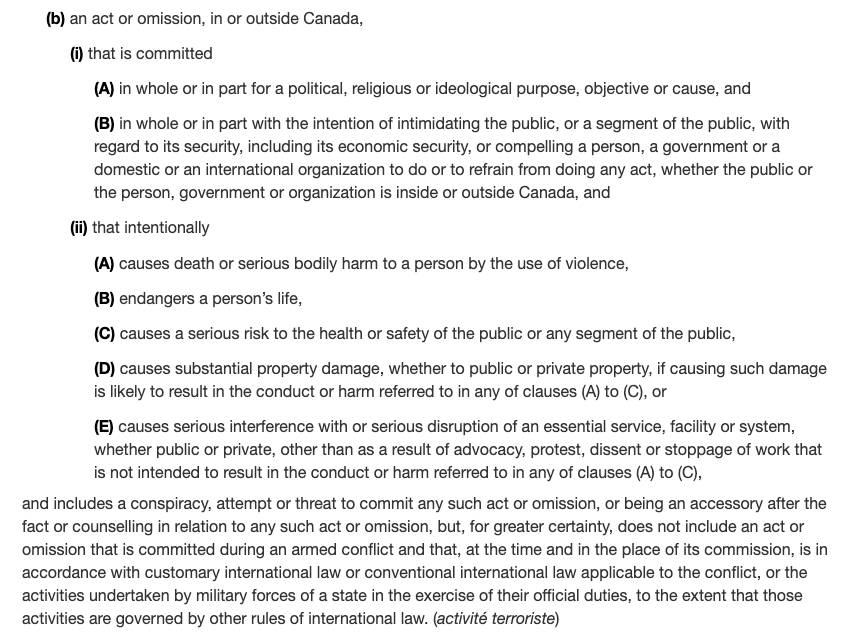Listen, hey, I know: Why bother engaging with this intellectually dishonest game of Trump charades? This move is incoherent for the United States, and it& #39;s triply so absurdly detached from reality for Canada. https://twitter.com/DerekSloanCPC/status/1267525654804942852">https://twitter.com/DerekSloa...
But, on the other hand, maybe it& #39;s a good thought exercise for does-and-doesn& #39;t constitute a terror organization in Canada.
Ok, so how does a government list a terrorist organization? The Public Safety minister can list an organization under 83.05(1) of the Criminal Code is satisfied that there are reasonable grounds to believe that the group was involved in terrorist activity. https://www.youtube.com/watch?v=aT01yIg35B4">https://www.youtube.com/watch...
So what& #39;s a terrorist activity? 83.01(1)(a)(b) lays it out in pretty detailed fashion. (There& #39;s actually more to it than this.)
In English: The government needs to be confident, to a standard that can be tested by the courts, that a listed entity committed acts of serious violence aimed to spark a specific ideological/political outcome.
Can you imagine how Kafka-esque that court hearing would be? Ok, you can prove a self-identified Antifa supporter threw a brick through a window. Or a group planned to light a building on fire — to what degree is there an & #39;entity& #39;? Can you identify any structure or organization?
Terror attacks can be prosecuted as such without listing the associated group as a terror entity; and an entity can be listed without ever being prosecuted. So the list can be more performative than functional, at times. But that& #39;s still something.
Most importantly, though, there is a legal process, here. Governments can& #39;t just start listing random groups as terrorist entities. A political candidate calling for that is very, very unnerving.
I go through all this not to dunk on Derek Sloan (the man can do that all himself) but to come around to the really difficult issue of the Incel movement. Many of the evidentiary issues I describe above apply here, too, although to a very different degree.
What does it mean to list a & #39;group& #39; as a terrorist entity when it is, in fact, a diverse ideological movement that includes alleged domestic terrorists as much as it does otherwise peaceful (albeit horrible) actors? It makes no sense, here.
Our terrorism laws weren& #39;t really built for this. Read the smarter-than-me @leahwest_nsl and @MichaelJNesbitt on the complexities of even listing paramilitary white supremacist movements. https://www.intrepidpodcast.com/blog/2019/7/4/proscribing-far-right-terrorism-canadas-new-terrorist-listing-of-two-far-right-extremist-groups">https://www.intrepidpodcast.com/blog/2019...
And here& #39;s more in Maclean& #39;s. https://www.macleans.ca/opinion/terrorism-laws-have-long-been-used-against-brown-and-black-men-when-will-they-be-used-to-protect-them/">https://www.macleans.ca/opinion/t...
At the same time, I think there& #39;s value in prosecuting mass killings as terrorism, if the facts bear it out. I don& #39;t think there& #39;s anything performative about that. Hence why I think this take misses the mark: https://foreignpolicy.com/2020/06/01/canada-may-host-the-worlds-first-incel-show-trial/">https://foreignpolicy.com/2020/06/0...
The author himself admits that if a manifesto was written, a terror charge may, in fact, be warranted (the whole argument seems to rest on the supposition that such a manifesto doesn& #39;t exist.) Maybe that& #39;s a good litmus test for terror charges. Maybe it& #39;s not.
The Incel problem is forcing us to reckon with a terrorism structure that was built to deal with a very specific threat. Widening the regime to cover all ideologically-motivated political violence doesn& #39;t make sense, but dismantling the whole system might go too far.
But what does strike me is that, for years, we prosecuted the hell out of every Hamas financier and ISIS recruit, without much of a second thought as to whether the Terrorism Act was purely "symbolic" or whether the prosecutions were more political than functional.

 Read on Twitter
Read on Twitter


